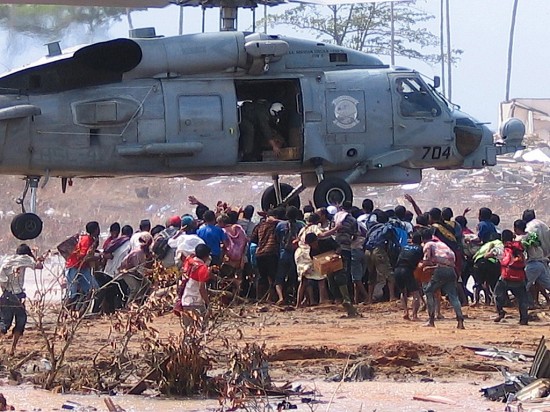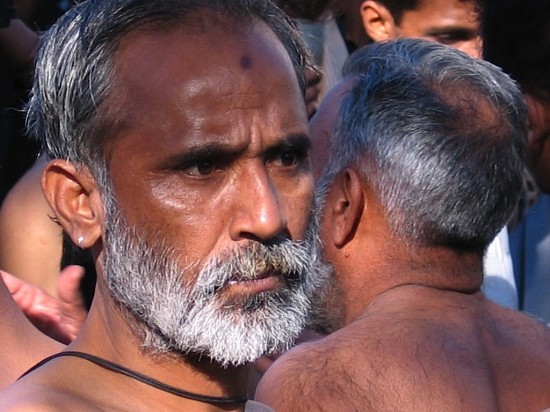Foreign correspondent Stephen Puddicombe has reported from some of the world’s most tragic places: Indonesia after the tsunami, Haiti after the earthquake, and the war zones of Iraq and Afghanistan. He hasn’t slept properly in years.
The life of a foreign correspondent is one of repeated compression and decompression. Like a deep sea diver, a reporter like CBC’s Stephen Puddicombe descends into places of extreme mental and emotional pressure. For 24 years, Puddicombe has covered scenes of horrifying disaster, both natural and man made, most recently the earthquake in Haiti, the tsunami in Indonesia and the invasions of Afghanistan and Iraq.
When he returns to his wife and three daughters in Halifax, Nova Scotia, he comes home a different human being than the one who left. Over time, he’s found the tools to decompress without succumbing to the constant pressure shifts and the post-traumatic stress.
When Puddicombe was 13, his father died of multiple sclerosis, leaving his mother to raise him and his sister. “I don’t know how,” he says, “because I was a typical brat; thought I knew everything. I give my mother a lot of credit.”
Speaking of his father’s influence on him, Puddicombe says, “He sat me down in front of television when Kennedy was killed, when Martin Luther King was killed, when the first rocket went to the moon. He brought us to Europe. He always said travel was everything.”
And travel is one of the things that brought him to journalism. Puddicombe met a journalist who sold him on the job. “He got to cover history. What a cool job. They pay you to travel and learn about what’s really happening.”
Puddicombe says of himself, “I’m just curious. I remember watching the Vietnam war on television. They talked about the numbers. Nobody ever talked about the people. The old lady with the two kids in the hut and how the bombing and napalm affected them.”
There is a measure of empathy that informs Puddicombe’s reporting, a quality not typical of hard news journalism and one that, when present, is very difficult to pull off without seeming condescending or opportunistic. Puddicombe’s empathetic journalism is always genuine, sometimes bordering on a kind of anger against tragic circumstances. “I try to do all my stories through someone’s eyes, how it affects them. I’m the luckiest person in the world. I get to tell stories about these absolutely outstanding people surviving in the most horrific circumstances. My heroes aren’t hockey players and politicians.”
It’s this empathic approach that’s so dangerous to a reporter like Puddicombe who receives counselling for post-traumatic stress disorder. “I see someone every time I come back,” he admits. “It weighs heavy on the mind. I haven’t slept properly in ten years because of some of the things I’ve seen. I always think ‘is there something else I could have done?’. You come out with survivor guilt. How come I’m allowed to come home to my house, three meals a day and my nice warm bed and they’re not?”
When asked to describe the work he has to do when coming home from a difficult assignment, Puddicombe said, “You come back and get your head into a different space. You realize people’s problems at home are important as well. It’s hard to get your head around things in terms of the scope. You go from an earthquake in Pakistan to a city council meeting in Halifax. Everything is important to its own degree.”
Besides the regular counselling, Puddicombe calls on his family to help with the decompression. “I talk to my family and my kids and show them pictures. I use them as a sounding board to talk about me and what I went through because the stories are never about me. A lot of people know where I’ve been so they understand why I might be off in the ether. It comes back really quick. It’s like riding a bicycle. You’re there one day and a week later you’re at home reporting about something totally different. That’s the beauty and the frustration of our job.”
Not only do his three daughters help him adjust to home life, they’re involved in the decision making process about leaving in the first place. “They have a veto on everywhere I go. Every time I’m called somewhere, I very quickly say, ‘This is what’s happening. What do you think?’”
The girls only turned him down once. “It was during a particularly nasty time in Jerusalem of suicide bombings. My eldest girls looked it up on the internet and asked me how I would know who’s got a bomb under their shirt. I said I didn’t. They told me, ‘We don’t want you to go.’ I told my boss I can’t go. I made this promise, and it’s the most important thing to me in the world.”
Ultimately, his kids keep him sane and after seeing so much horror and destruction, they also lend his work purpose. “I find young people very hopeful. They know so much more than when I was a kid. They’re so much smarter. I think they’re going to run the world a lot better than we’ve been doing.”
Photo Credits
“Desperation after the wave” by Stephen Puddicombe, CBC. All Rights Reserved.
“Muharram: Reflections of Religion” by Stephen Puddicombe, CBC. All Rights Reserved.




[…] This post was mentioned on Twitter by Dan L Hays, pippa best and Lorne Daniel, Life As A Human. Life As A Human said: New Article, Surviving Decompression: The Foreign Correspondent Comes Home – http://tinyurl.com/4ez4ctn […]